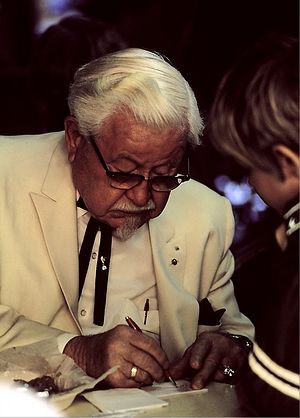Who is the most famous Kentuckian? Among the living, the best candidates would probably be George Clooney (born in Lexington) and Muhammed Ali (a native of Louisville). Including the dead, Abraham Lincoln might take pride of place, although Lincoln always considered Illinois his true home.
Internationally, there can be little debate; Harland Sanders is the face of Kentucky in a way that no other individual can match. Kentucky Fried Chicken (now known as KFC in most of the U.S.) has become one of the most successful fast-food brands in the world, and the commodification of Sander’s image and persona has been key to that success.
Colonel Harland Sanders (the term “Colonel” is an honorific authorized by the Commonwealth of Kentucky; in the interests of full disclosure, the author of this article is also a Kentucky Colonel) founded Kentucky Fried Chicken in the 1950s, and began franchising it in the 1960s. The chain achieved tremendous success domestically and internationally, although growth within the United States began to fade in the 1990s as tastes changed.
Fried chicken has the edge over other American fast foods on the international stage in that it doesn’t run up against any serious dietary restrictions, beyond cholesterol reduction; no major world religion forbids the breading and deep frying of poultry. KFC has taken advantage of this, but other U.S. brands (including Chick-Fil-A and Popeyes) have also moved overseas. KFC opened its first restaurant in China in 1987, and as of 2014 had 4563 outlets in the country (the largest single franchise in the PRC). In Japan, KFC opened its first store in 1970, and now has just short of 1200 outlets. KFC has also enjoyed spectacular growth in India and Indonesia.
KFC’s advantage lies not just in its first-mover status; Harland Sanders is a far more iconic advertising image than the competitors could offer. Kentucky Fried Chicken has succeeded in Asia because of its unique ability to pair an appeal to rural tradition (Kentucky) with an appeal to capitalist modernity. Until his death in 1980, Sanders aggressively supported the development of his image. This has led to tremendous sales success in both China and Japan, notwithstanding supplier problems in the former that dented product growth. Indeed, KFC is now trying to turn around its domestic sales with a resort to the same pitch. Facing successful challenges from its competitors within the United States (especially Chick-Fil-A) KFC has decided to give Harland Sanders a far more prominent place in its advertising than had recently been the case.
Chicken money has found its way back to Kentucky. As Zach Karabell wrote in May, the success of KFC and its associated brands in China and Japan has given Yum! Brands the financial heft to lavishly sponsor the Kentucky Derby, as well as other events in Louisville and the greater Bluegrass region. Kentuckians, as might be expected, often display a studied unease about the legacy of KFC, welcoming the attention and economic benefit, while resenting the enduring sense of rural poverty that the brand has struggled to shed.
This article is the final installment in a series, written by Kentucky-based Robert Farley, on the links between the U.S. state of Kentucky and the Asia-Pacific. See his previous posts on Kentucky’s Rand Paul, Mitch McConnell, horse, bourbon, and car links with the region.

































